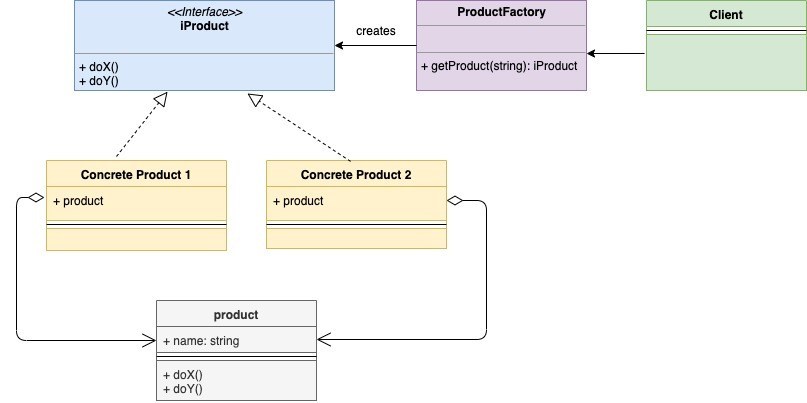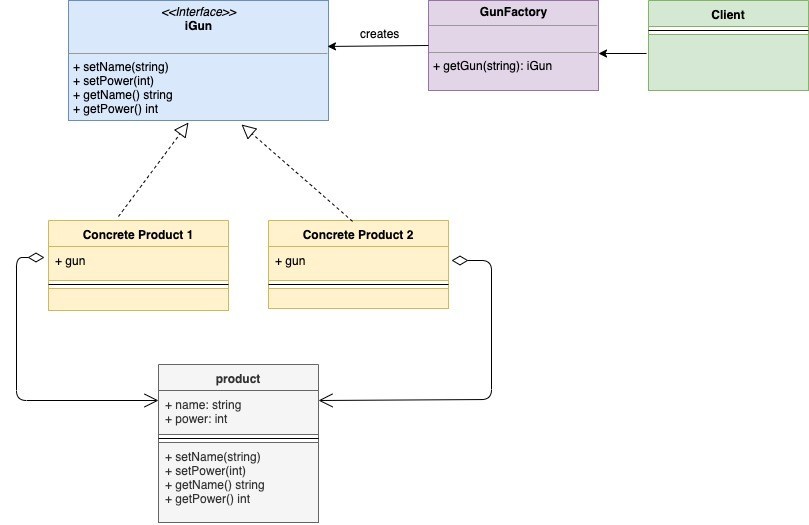
Go Notes of Factory Design Pattern (7)
Factory Design Pattern in GOLANG
Introduction
Factory design pattern is a creational design pattern and it is also one of the most commonly used pattern. This pattern provides a way to hide the creation logic of the instances being created.
The client only interacts with a factory struct and tells the kind of instances that needs to be created. The factory class interacts with the corresponding concrete structs and returns the correct instance back.
In below example:
-
We have iGun interface which defines all methods a gun should have
-
There is gun struct that implements the iGun interface.
-
Two concrete guns ak47 and maverick. Both embed gun struct and hence also indirectly implement all methods of iGun and hence are of iGun type
-
We have a gunFactory struct which creates the gun of type ak47 or maverick.
-
The main.go acts as a client and instead of directly interacting with ak47 or maverick, it relies on gunFactory to create instances of ak47 and maverick
UML Diagram:

Below is the corresponding mapping UML diagram with the example given above

Mapping
The below table represents the mapping from the UML diagram actors to actual implementation actors in “Example” below
| ProductFactory | gunFactory.go |
|---|---|
| iProduct | iGun.go |
| Product | gun.go |
| Concrete | iProduct 1 ak47go |
| Concrete | iProduct 1 maverick.go |
| Client | main.go |
Example
iGun.go
package main
type iGun interface {
setName(name string)
setPower(power int)
getName() string
getPower() int
}
gun.go
package main
type gun struct {
name string
power int
}
func (g *gun) setName(name string) {
g.name = name
}
func (g *gun) getName() string {
return g.name
}
func (g *gun) setPower(power int) {
g.power = power
}
func (g *gun) getPower() int {
return g.power
}
ak47.go
package main
type ak47 struct {
gun
}
func newAk47() iGun {
return &ak47{
gun: gun{
name: "AK47 gun",
power: 4,
},
}
}
maverick.go
package main
type maverick struct {
gun
}
func newMaverick() iGun {
return &maverick{
gun: gun{
name: "Maverick gun",
power: 5,
},
}
}
gunFactory.go
package main
import "fmt"
func getGun(gunType string) (iGun, error) {
if gunType == "ak47" {
return newAk47(), nil
}
if gunType == "maverick" {
return newMaverick(), nil
}
return nil, fmt.Errorf("Wrong gun type passed")
}
main.go
package main
import "fmt"
func main() {
ak47, _ := getGun("ak47")
maverick, _ := getGun("maverick")
printDetails(ak47)
printDetails(maverick)
}
func printDetails(g iGun) {
fmt.Printf("Gun: %s", g.getName())
fmt.Println()
fmt.Printf("Power: %d", g.getPower())
fmt.Println()
}
Full Working Code
package main
import "fmt"
type iGun interface {
setName(name string)
setPower(power int)
getName() string
getPower() int
}
type gun struct {
name string
power int
}
func (g *gun) setName(name string) {
g.name = name
}
func (g *gun) getName() string {
return g.name
}
func (g *gun) setPower(power int) {
g.power = power
}
func (g *gun) getPower() int {
return g.power
}
type ak47 struct {
gun
}
func newAk47() iGun {
return &ak47{
gun: gun{
name: "AK47 gun",
power: 4,
},
}
}
type maverick struct {
gun
}
func newMaverick() iGun {
return &maverick{
gun: gun{
name: "Maverick gun",
power: 5,
},
}
}
func getGun(gunType string) (iGun, error) {
if gunType == "ak47" {
return newAk47(), nil
}
if gunType == "maverick" {
return newMaverick(), nil
}
return nil, fmt.Errorf("Wrong gun type passed")
}
func main() {
ak47, _ := getGun("ak47")
maverick, _ := getGun("maverick")
printDetails(ak47)
printDetails(maverick)
}
func printDetails(g iGun) {
fmt.Printf("Gun: %s", g.getName())
fmt.Println()
fmt.Printf("Power: %d", g.getPower())
fmt.Println()
}